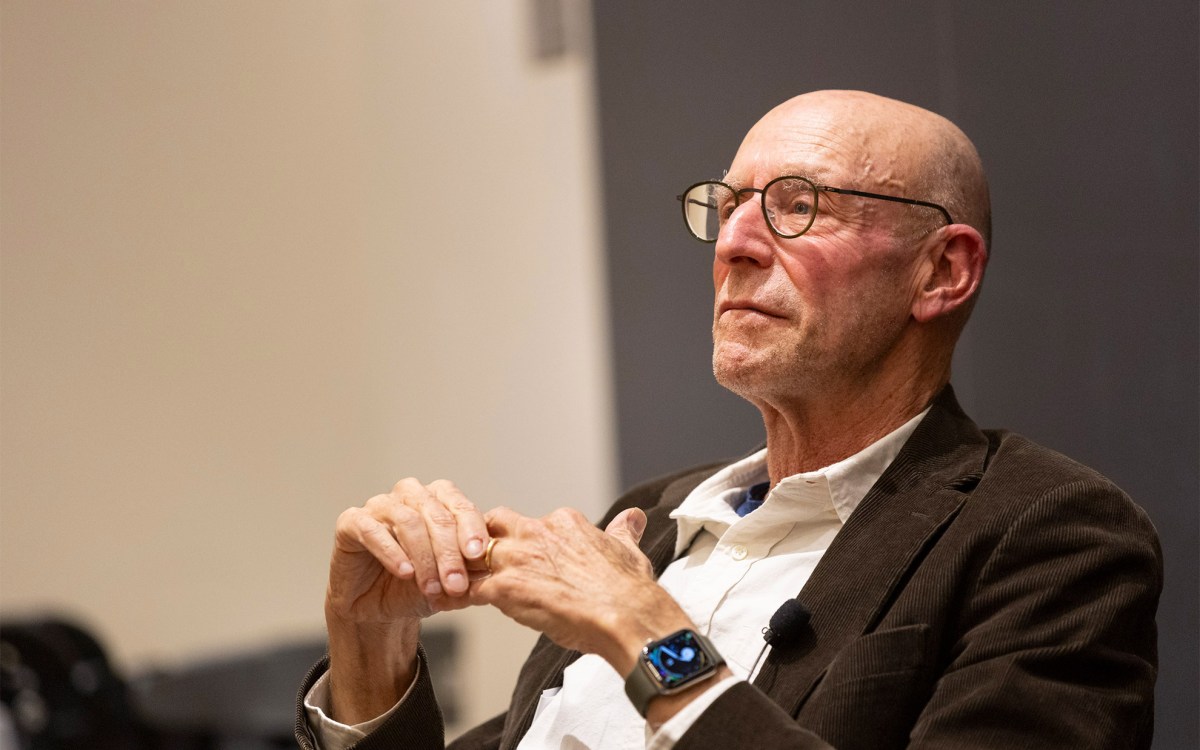Health
-

Yoga can help cut severe, initial opioid-withdrawal period in half, study finds
Researchers say results could dramatically increase chances of recovery
-

6 keys to a long, healthy life (ice cream included)
Also, why reading Ben Franklin beats climbing Mount Everest
-

Six cancers rising faster in younger adults than older ones
Large new global study fuels growing concern over trend of increases in several types

-

What’s next for GLP-1s?
Scientists eye new treatment targets for popular weight-loss drugs, from heart failure to addiction
-

Drinking 2-3 cups of coffee a day tied to lower dementia risk
Caffeinated tea also found to slow cognitive decline in study

-

New AI tool predicts brain age, dementia risk, cancer survival
Unlike other AI models, BrainIAC needs limited data to ID key neurological health indicators

-
HMS/MGH’s Bruce Walker presents update on vaccine progress
Bruce Walker recalls sitting across from a person long-infected with HIV who never took antiretroviral drugs and never developed AIDS. Walker remembers thinking that the person’s body held a secret of which even they were unaware: how to stop the global AIDS pandemic.
-
Seeing what they hear, to better understand ourselves
It was a long drive from St. Louis to Florida, but Darlene Ketten had finally made it. Standing in the warm surf of St. George Island, she watched with delight as tiny, colorful bean clams popped out of the sand and then quickly reburied themselves as the waves foamed around her calves.
-
Health, rights journal open to all
December will mark the 60th anniversary of the Universal Declaration of Human Rights, a United Nations convention that in 30 articles memorializes basic freedoms involving speech, property, health, security, and the rule of law.
-
Harvard Forest: 3,500 acres, global impact
Harvard may be rooted in Cambridge, but it has a lot more roots in the small north-central Massachusetts town of Petersham. That’s where you’ll find the woods, streams, and fields of the Harvard Forest, a 3,500-acre research and teaching facility that’s been part of the University for more than a century. Having been closely monitored since 1907 — and with a provenance dating to a Colonial farm established in the mid 1700s — the history of this tract is likely better-documented than that of any other forest in the United States.
-
Stem cell summit hails bench progress, looks to bedside future
New discoveries concerning cell reprogramming over the past year have boosted stem cell researchers in the lab and encouraged efforts to transfer test tube and lab animal advances to humans suffering degenerative diseases such as diabetes, Parkinson’s disease, and Lou Gehrig’s disease.
-
Important new step toward producing stem cells for human treatment
A team of Harvard Stem Cell Institute (HSCI) scientists has taken an important step toward producing induced pluripotent stem (iPS) cells that are safe to transplant into patients to treat…
-
Transfer of hospitalized patient from one resident to another can lead to harm
A significant percentage of resident physicians report that patient handoffs – transfer of responsibility for a hospitalized patient from one resident to another – contributed to incidents in which harm…
-
NIH names Harvard Pioneers, Innovators
Harvard faculty members comprise almost 20 percent of the 47 scientists nationally whose promising and innovative work was today recognized with the announcement of two grant programs through the National…
-
HPV, cervical cancer link earns scientists Alpert Prize
Two scientists who discovered that specific types of human papillomavirus, or HPV, cause cancer of the cervix received the 20th annual Warren Alpert Foundation Scientific Prize on Sept. 15. As part of the day’s celebration, the prize winners Harald zur Hausen and Lutz Gissmann — both professors at the German Cancer Research Center in Heidelberg — delivered talks at a symposium in Harvard Medical School’s New Research Building (NRB).
-
Immune Disease Institute Wins Annenberg Grant to Support International TB and AIDS Care and Research
The Immune Disease Institute has received a two-year, $150,000 award from the Annenberg Foundation to support its ongoing work in international health. The funds will support efforts to combine basic…
-
Harvard Medical School, MGH researcher Gary Ruvkun to share 2008 Lasker Award
Gary Ruvkun, a Harvard Medical School genetics professor in the Massachusetts General Hospital (MGH) Center for Computational and Integrative Biology, is one of three scientists named co-recipients of the 2008…
-
Harvard Initiative for Global Health recipient of NIH Global Health Nutrition grant
The Harvard Initiative for Global Health (HIGH) has been selected to receive a prestigious $400,000 Framework Programs for Global Health grant from the National Institutes of Health’s Fogarty International Center.…
-
Cutting in on the AIDS-TB death dance
On a hill in South Africa’s KwaZulu Natal province, near the hall where Nelson Mandela delivered his last speech before prison and the station where Mahatma Gandhi was tossed off a train to begin his life’s work, stands Edendale Hospital.
-
Three hours at Nohana
“I just want to see how bad things are in the clinic,” Jennifer Furin said. “It’s a ‘doctor fear’ that someone is bleeding out while I’m standing here eating chocolate.”
-
Jamaican lizards’ calisthenics mark territory at dawn, dusk
What does Jack LaLanne have in common with a Jamaican lizard? Like the ageless fitness guru, the lizards greet each new day with vigorous push-ups. That’s according to a new study showing that male Anolis lizards engage in impressive displays of reptilian strength — push-ups, head bobs, and threatening extension of a colorful neck flap called a “dewlap” — to defend their territory at dawn and dusk.
-
HSCI researchers see major breakthrough
In a feat of biological prestidigitation likely to turn the field of regenerative medicine on its head, Harvard Stem Cell Institute (HSCI) co-director Doug Melton and postdoctoral fellow Qiao “Joe” Zhou report having achieved what has long been a dream and ultimate goal of developmental biologists — directly turning a fully formed adult cell into another kind of fully formed, functioning adult cell.
-
When genetics gets personal
Just five years after the Human Genome Project announced it had decoded the first human DNA, the era of personal genetics is dawning, bringing with it not just the promise of targeted, personalized medicine and a new level of self-knowledge, but also a host of ethical, legal, and practical issues. A new project out of a Harvard Medical School genetics lab is trying to make sure we’re prepared to deal with the potential benefits and pitfalls arising from these issues.
-
Efficiency of producing iPS cells markedly improved
Some of the most challenging obstacles limiting the reprogramming of mature human cells into stem cells may not seem quite as daunting in the near future. Two independent research groups,…
-
Advanced blood analysis may speed diagnosis of heart attacks
Someday doctors may be able to use a blood test to confirm within minutes, instead of hours, if a patient is having a heart attack, allowing more rapid treatment that…
-
Harvard Catalyst is up and running
The Harvard Catalyst, an unprecedented pan-University collaborative effort committed to harnessing the human, technological, and fiscal resources of Harvard and its academic healthcare centers (AHCs) to reduce the burden of…
-
Scientists Who Linked HPV with Cervical Cancer Win 20th Annual Alpert Prize
Two scientists who discovered that specific types of human papillomavirus, or HPV, cause cancer of the cervix will receive the 20th annual Warren Alpert Foundation Scientific Prize on Sept. 15.…
-
Eli and Edythe L. Broad endow the Broad Institute of Harvard and MIT with additional $400 million
Los Angeles-based philanthropists Eli and Edythe Broad today declared the Broad Institute of Harvard and MIT an unprecedented success as an experiment in science and philanthropy, and announced that they…
-
Broad Institute awarded $86 million NIH grant
Researchers at the Broad Institute of Harvard and MIT have been chosen to receive a six-year, $86M grant from the National Institutes of Health (NIH) to identify and develop molecular…
-
Samuel Kou appointed professor of statistics
Samuel Kou, whose modeling of nanoscale processes within molecules has opened up important new frontiers at the intersection of statistics and chemistry, has been appointed professor of statistics in Harvard…
-
Harvard Stem Cell Institute researchers turn one form of adult mouse cell directly into another
In a feat of biological prestidigitation likely to turn the field of regenerative medicine on its head, Harvard Stem Cell Institute (HSCI) co-director Doug Melton and post doctoral fellow Qiao…
-
Driven:
When the baby vomited again, Gail Melton knew something was seriously wrong with her second child, a son she and her husband, Doug Melton, had named Sam. She phoned Doug…
-
Jamaican lizards mark their territory with shows of strength at dusk and dawn
What does ageless fitness guru Jack LaLanne have in common with a Jamaican lizard? Like LaLanne, the lizards greet each day with vigorous push-ups. That’s according to a new study…
-
Next-generation tool for visualizing genomic data introduced
Researchers are collecting vast amounts of diverse genomic data with ever-increasing speed, but effective ways to visualize these data in an integrated manner have lagged behind the ability to generate them. To address this growing need, researchers at the Broad Institute of MIT and Harvard have developed the Integrative Genomics Viewer (IGV), a novel and freely available visualization tool that helps users simultaneously integrate and analyze different types of genomic data, and gives them the flexibility to zoom in on a specific genomic region of interest or to pan out for a broad, whole-genome view.
-
Neurons created from skin cells of elderly patients with ALS
Less than 27 months after announcing that he had institutional permission to attempt the creation of patient- and disease-specific stem cell lines, Harvard Stem Cell Institute (HSCI) principal faculty member Kevin Eggan proclaimed the effort a success — though politically imposed restrictions and scientific advances prompted him to use a different technique than originally planned.
-
Daley and colleagues create 20 disease-specific stem cell lines
Harvard Stem Cell Institute (HSCI) researcher George Q. Daley, associate director of the Stem Cell Program at Children’s Hospital Boston, has with HSCI colleagues Chad Cowan and Konrad Hochedlinger of Massachusetts General Hospital (MGH) produced a robust new collection of disease-specific stem cell lines, all of which were developed using the new induced pluripotent stem cell (iPS) technique. The work is described in a paper published in the Aug. 7 online edition of the journal Cell.


